IN FOCUS: Meet the funeral director who quit teaching to comfort the bereaved
An unplanned career pivot saw a former teacher move from a classroom to a funeral home. In the process, she discovered her calling and grew closer to her father.
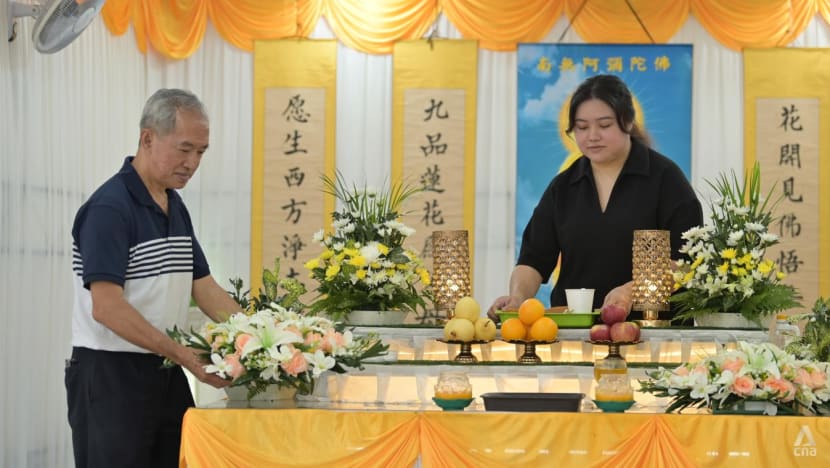
Funeral director Tan Xiaohui (right) and her father Tan Chee Tong preparing for a wake. (Photo: CNA/Raydza Rahman)
- With people being encouraged to embrace lifelong learning in case they want or need to switch careers, a funeral director shares why she gave up teaching to help the bereaved
- Going into the industry was a "complete culture shock" and she had to pick up new skills on the job
- She urged those who are planning to do so to give themself the time to adapt and learn
SINGAPORE: Growing up, Ms Tan Xiaohui’s father never talked about what he did for a living, even when he had to work during festive holidays like Chinese New Year.
“He was always not around,” she said. “I don’t remember being comfortable spending time alone with my father because it used to be awkward.”
Advertisement
In 2015, her father got into a traffic accident. He was supposed to be hospitalised, but insisted on being discharged and went back to work immediately.
It was the June school holidays and Ms Tan, then a secondary school maths teacher, had free time. Her mother asked if she would help her father out for the rest of her break.
That was how she saw, for the first time, her father’s work as a funeral director. He helped bereaved families in their most vulnerable moments, using his empathy and expertise to bring them comfort and closure.
The holiday stint ended, and she returned to the classroom. But two years later, Ms Tan, 32, took an unexpected turn in her career when she left teaching to join the funeral business.
Over the last few years, more people are being encouraged to embrace the idea of lifelong learning, so that if they choose to make a career switch, they are as well-placed as possible to do so.
Advertisement
Ms Tan broke a scholarship bond to make that switch, but in the process, found a calling that has stretched her limits, given her a sense of purpose, and brought her and her father closer together.
BATTLING THE STIGMA
Ms Tan’s father, Mr Tan Chee Tong, started volunteering at a Buddhist temple in his youth. Now 62, he was working in the import-export trade about 20 years ago when the temple asked him to help organise funerals on a voluntary basis.
He agreed, and as the years passed, gave over more of his time to death care work. He received payment only for funeral expenses, but otherwise gave freely of his time and energy.
“At that time I was handling everything by myself, so it became quite tiring. Because many traffic accidents would happen,” he told CNA in Mandarin.
Even when he decided to take a break from volunteering, families continued to approach him for help with wakes and funerals. There weren’t enough people who could and would do such work.
Advertisement
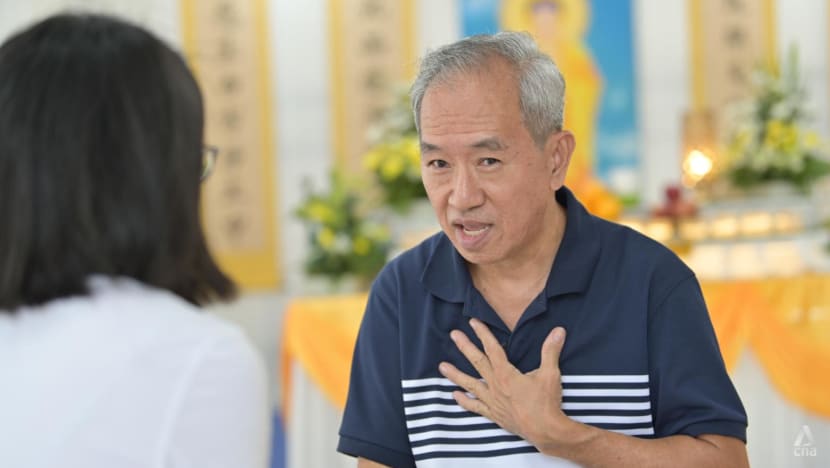
About 10 years ago, amid tough times in the import-export trade, Mr Tan and his partner decided to wind down their business. He made his own career pivot and established Qing Xing Funeral Services.
There are people who hold negative stereotypes of the funeral industry, but Mr Tan, a devout Buddhist, said he doesn’t concern himself with them.
“Do what you should do, and there’s no need to bother yourself with how people look at you.”
In her first stint working with her father, Ms Tan felt proud seeing him help families through their grief. But she still avoided mentioning his job to other people, including her friends, because of the stigma she felt around the occupation.
Then the mother of one of her close friends died. At the wake, which was organised by another funeral director, her friend relayed stories of how lost his family had felt when his mother died, and how they had gone along with the funeral service suggested by the hospital.
Advertisement
Ms Tan remembered her father’s calm and efficient way of working with families, how he answered their questions and gave them direction.
She spotted details in the woman’s wake and funeral that fell below her and her friend’s expectations.
Back at home, she conferred with her father about these details and realised that he was doing something “really different” for his clients.
“I remember that deep down it was really sobering because I realised that if I had told my friend earlier, perhaps my dad would have been able to help him,” she said.
“That also let me realise that my dad has a standard in the industry that I was not aware of because it’s so hard to compare.”
It was a turning point in her thinking, said Ms Tan. She decided then to be open with people around her about her father’s job because it could help them.
NOT JUST A FUNERAL DIRECTOR
In 2017, Ms Tan broke her government scholarship bond, paying off the balance with her savings.
She loved to teach but longed for “more freedom” in the classroom and more time with her students instead of administrative work.
She quit without telling her parents or lining up a job, and gave tuition while trying to figure out her next step.
“I was definitely not considering entering the funeral trade … it is completely unplanned.”
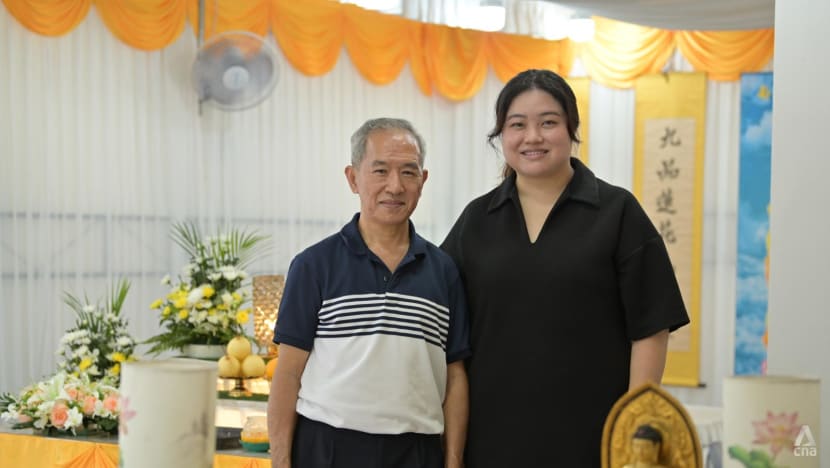
Her father was organising so many funerals at the time that he was sleeping only three to four hours a night. Ms Tan’s mother again asked her to help him out, if only to make sure he didn’t doze off while driving.
It has now been six years since she made the switch from classroom to funeral home.
When someone dies, funeral directors are the people who usher the bereaved through the process of mourning.
The job is heavy on logistics, but more importantly, on emotion.
“You’re there not just as a funeral director, you’re also there to calm them down, to provide them support,” said Ms Tan.
Sometimes, she will receive calls from people worried about funeral details even before their loved ones have died.
When that happens, she tells them to seize the remaining time and concentrate on spending it together – administrative matters can wait.
Her journey with the family usually starts when she goes to the mortuary to collect the body.
A typical Singaporean Chinese wake lasts three or five days. Before that, the body must be sent for embalming, permits need to be obtained for the wake, slots need to be booked for cremation and interment of ashes, and the wake and funeral need to be organised.
A funeral director does all that, and consults the family on religious needs and other preferences. Did they or the deceased want a maximalist or minimalist funeral? How should the body be made up and dressed? How do they want to memorialise their loved one?
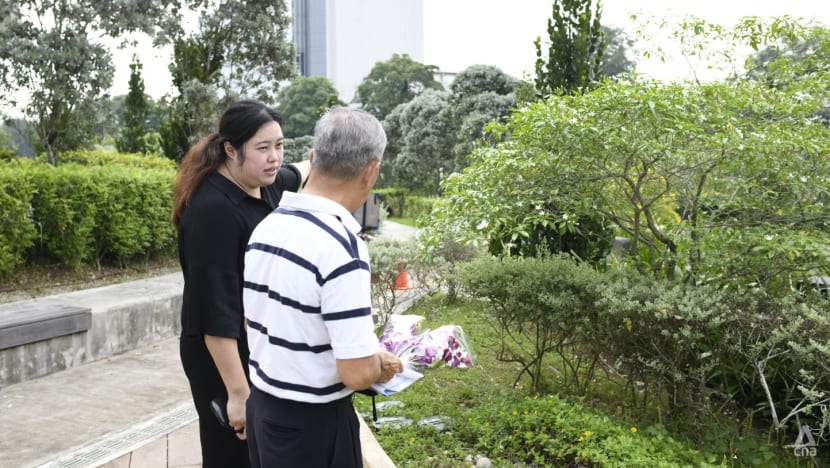
After the body is cremated, she accompanies the family to the niche where the ashes will be kept, or to the garden or sea where they will be scattered, and guides them on how to pay their respects.
For Ms Tan, a good funeral is when the family can grieve but also experience healing and catharsis. “It’s an expression of love, and most of the time, it’s also their time to express their regrets,” she said.
COMPLETE CULTURE SHOCK
Ms Tan describes her career pivot as a “complete culture shock”. One of her strongest early impressions is that her funeral crew often communicated by shouting at each other.
The contrast between a school environment “where students are just sitting there quietly listening to you” and an industry “where it’s normal for the staff to raise their voice” was jarring, and pointed to the more physical and informal nature of her work.
Also shocking was finding out that her father’s record-keeping was done entirely with pen and paper. “When I first joined, everything was a mess,” she recalled.
Ms Tan – who graduated with a bachelor’s degree in education – noted that many small business owners share the same headaches as her.
She had to pick up skills on the job, such as accounting, customer relations, human resources, procurement and inventory.
There are no formal qualifications for funeral directors in Singapore. But short courses – such as a three-day programme at the Institute of Technical Education – offer a glimpse into the work, including the psychology of grieving and emotional management.
It wasn’t just about picking up new skills – one major challenge was the potential conflict with her personal time.
As a teacher, she had “protected time” away from work during the school holidays. But working in death care meant being on call 24/7 and working weekends, public holidays, late nights and early mornings.
“I feel that there is no greater event in a person’s life than a death,” she said. “This takes precedence over everything else. When someone calls me, I should be there – first time (they call) – and I should be there throughout.”
Working in a small family business also means there is no career ladder to climb. Ms Tan declined to reveal her income, but said the greatest difference from teaching is not the amount of money she makes, but its regularity.
“It was much easier as a teacher. I just do my job and then the money comes in,” she said. As a small business owner, there needs to be enough work to take care of her staff and overheads.
“There are so many things that you have to invest back into the business, like better equipment, and you have to gauge for yourself the amount to invest back in, or how much to pay yourself – in fact, you pay yourself last.”
“YOU’RE NOT GOING TO LAST LONG”
To others looking at Ms Tan’s life and choices, her unconventional career pivot has not always been understandable. Acquaintances and former colleagues reacted with disbelief and some even with pity.
“You would do well (in teaching), so why do you want to change to a job that has no fixed working hours and has a lot of emotional baggage?” she said, recalling the comments she would hear.
The high emotion involved in guiding families through a funeral can take a toll, and she has only recently started carving out an hour each day to process what she goes through on the job.
Well-meaning acquaintances expected Ms Tan to go into private education after she left teaching, and suggested career alternatives after she told them what she had been doing.
Even her own funeral crew and clients felt this way in the beginning. “They would say, ‘why are you doing this? There are so many better options for you’,” she recalled.
“I realised that initially the families just think that I’m doing this because I probably failed at my exams, I probably didn’t go to (university).”
She laughed while recalling how a client, after learning that she used to be a maths teacher, asked her to help his son with some maths homework at a wake.
Ms Tan has met many people who consider her overqualified for death care.
The funeral industry is also one where “ironically, the more educated you are, the more people feel that you are not going to last long”, because they tend to think “it’s a last resort” for graduates, she said.
These words affected her, especially at the start.
“Of course, my mind will tell me, why didn’t you just stick to being a teacher? You’re doing well, so why put yourself through this?
“After a few years in the industry, I feel that actually there is no overqualification in handling death,” she said.
“I only hear such comments from people who have not experienced loss in their family before. Because I have a flipside of people who are telling me that it’s a very noble job, and I know how hard it can get.”
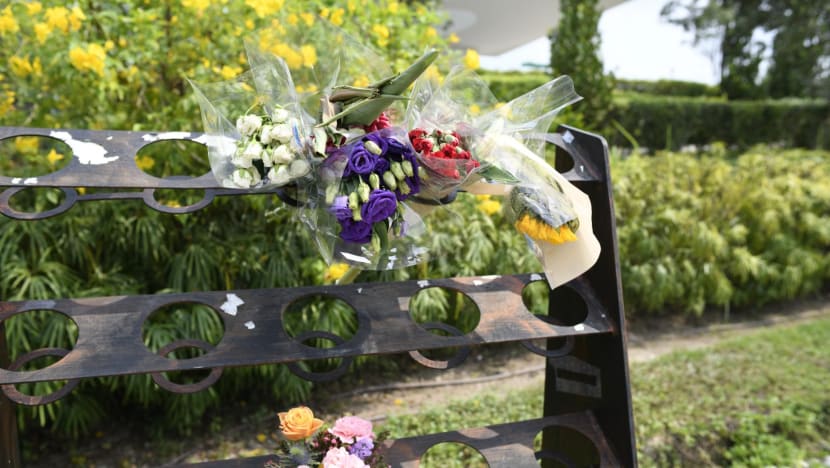
The naysayers did help in one way – strengthening her resolve to stick to her choice.
“Since young I’ve always been very open to challenges. And the more someone tells me that you cannot do this, I will do it,” she said.
Ms Tan has found that doing the work is the best way to change people’s preconceptions.
“I think what really overturned this discrimination is when you show them that you are capable of handling the dead bodies as well, and you are capable of doing what they feel that you cannot do,” she said.
“Sometimes the deceased can be in a state of decomposition already, so they feel like you cannot handle the sight of it, or you cannot handle the stench of it. When you are able to do it, it slowly changes their perspective.”
Whether you have a university degree does not matter, she said.
“In this industry, for you to last, there are only two things – you must have a heart of empathy, and you (must) really genuinely want to serve the family.
“Without these two qualities, it’s not possible for you to last through the sleepless nights and all those mental challenges that you face.”
DO NOT GIVE IN TO SELF-DOUBT
Ms Tan was apprehensive about changing jobs at first because she enjoyed parts of being a teacher. Becoming a funeral director also strayed from the career milestones she used to imagine herself hitting by a certain age.
But seeing how death impacts everyone, regardless of their achievements in life, and how her work helped families to move forward, convinced her of the new path she had chosen.
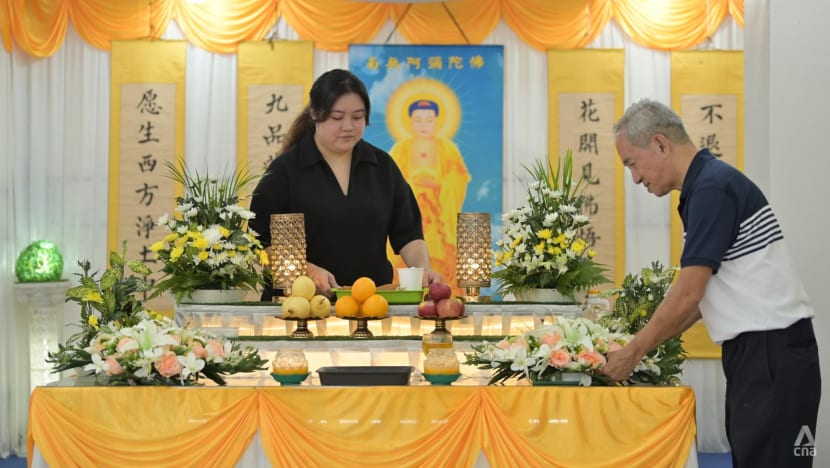
She is not the only one changing jobs over the last few years.
In 2022, the proportion of workers in Singapore who changed jobs in the past two years rose to 17 per cent – the highest in six years. While the incidence of job-switching rose across all age groups, it was highest among workers aged below 30.
According to the Manpower Ministry’s annual labour force report, such younger workers are more likely to change jobs as they "readily explore different career options" to gain more experience.
Last month, Deputy Prime Minister Lawrence Wong urged workers to stay relevant and competitive in their skills, amid a challenging environment marked by external uncertainties and domestic constraints.
The government’s spending on its SkillsFuture programme has almost doubled to nearly S$1 billion (US$729 million) this year, but it “can and will do more” to invest in lifelong learning and reskilling, he added.
Ms Tan, who was under 30 at the time of her own pivot, acknowledged that a career change can become scarier with age, as older people may have more responsibilities.
She pointed out the importance of considering the pros and cons of one’s current job so as to avoid making an impulsive decision.
After making the switch, “give yourself a timeframe to adapt, prepare to learn, unlearn and relearn, and then give it your best shot”, she said.
“What helped me was to not think about ‘if you fail, it is okay’. Instead at each roadblock, I think about how to overcome it and not give in to self-doubt.”
There will always be people who do not support the move, but having self-belief is critical, she added.
“In the process of a new career you may or will fall hard, and that is okay. I give myself five minutes to cry about it then I pick myself up and try again because that is how growth happens.”
For her, the challenge is bringing new blood into the industry. Few people are willing to make the change that Ms Tan did.
Ms Tan and her father are the only members of her family involved in Qing Xing, and they work with four other workers.
For two years, they have been trying with no success to hire one more staff member – even for roles that do not involve working with bodies, such as office work and liaising with clients.
When she has managed to get a new recruit through the door, there have been times when that person’s family members would call her to express reservations, and she would have no choice but to let the potential hire go.
The labour crunch applies across the industry. It is hard enough getting Singaporeans into the service industry, let alone the funeral sector, said Mr Hoo Hung Chye, executive director of the Association of Funeral Directors.
The manpower quota also means there needs to be a core of local workers before funeral firms can hire foreigners, he said.
The National Environment Agency (NEA) said last year there are at least 800 vacancies to be filled in the funeral industry over the next few years.
The shortfall in workers can be felt in the way the number of deaths is rising “but we don’t see a huge in-tandem growth of new blood coming into our industry”, leading to overwork, said Mr Hoo. Deaths in Singapore rose 10.7 per cent to almost 27,000 last year.
The problem is that “nobody really aspires to a career in the funeral industry”, he told CNA.
“In terms of raising the public perception, the negativity or some will call it ‘pantang’-ness of our industry, then that would really help,” he said, using the Malay word for taboo or superstition. “So they will see that this is a real profession that needs to be respected.”
While there is a gap in the market to fill, Mr Hoo, a funeral director who is the founder of Singapore Funeral Services, also cautioned against the idea of making a quick buck and profiting from the death care industry.
At the end of the day, there is “a demand on the service providers to do their job diligently and ethically, because it’s really a family we’re serving”, he stressed.
“YOU PASSED”
Having heard countless eulogies in her line of work, Ms Tan can easily name the top regrets of the living: Not being in time to apologise, and not spending enough time with the person who has died.
This hit home in 2018 when she bought her father surprise plane tickets to Jakarta to see his mother. Ms Tan’s father had told her that if he were to die suddenly, his top regret would be not spending enough time with her grandmother.
“When my dad told me this, I immediately wanted to solve it,” said Ms Tan. “It just hit me that even though we are in this industry, have we taken time out to reflect on our own regrets?
After her father left for Indonesia, she took on the business herself, but with the burgeoning workload, her father returned halfway through the trip.
“But I never regretted that decision, because that was also the last time my father saw my grandmother alive before she abruptly passed in 2019.”
After coming back from her grandmother’s funeral, her father thanked her for “jumping the gun” and “being impulsive”, she said.
It also changed their working relationship. Ms Tan’s learning curve went up “vertically” when her father first went away, and she realised how much he had been sheltering her from the demands of their work.
The next time her father left Singapore for her grandmother’s funeral, Ms Tan was prepared to hold the fort alone for four days. When her father returned, he went to get feedback from the families.
The verdict was relayed through Ms Tan’s mother, who told her: “You passed.”
This browser is no longer supported
We know it's a hassle to switch browsers but we want your experience with CNA to be fast, secure and the best it can possibly be.
To continue, upgrade to a supported browser or, for the finest experience, download the mobile app.
Upgraded but still having issues? Contact us









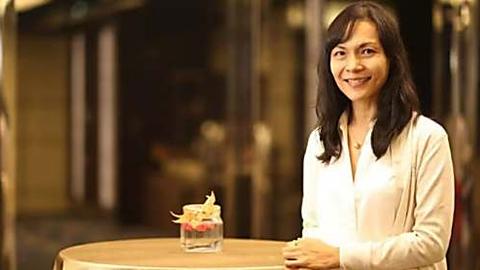







No comments:
Post a Comment